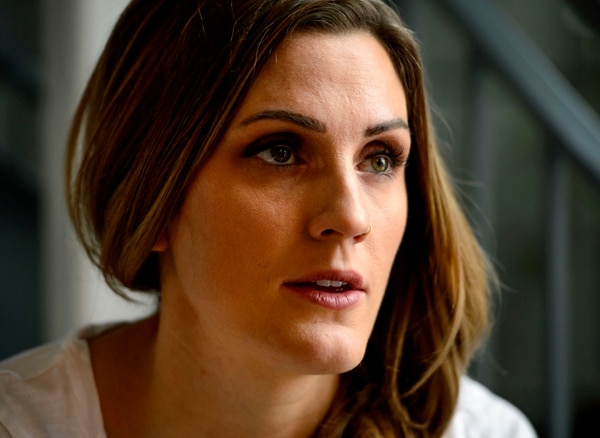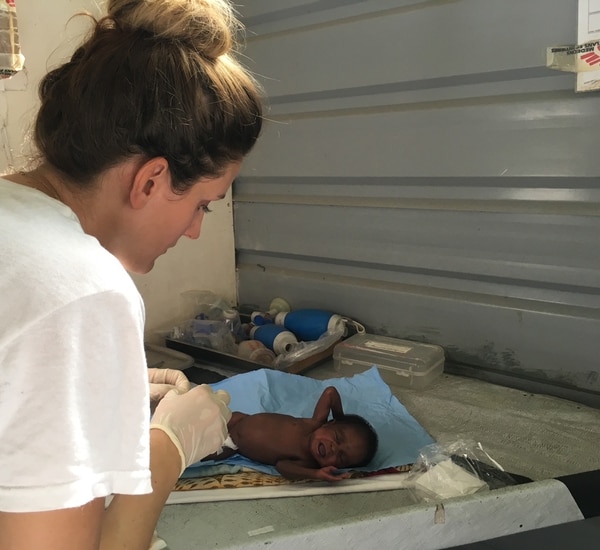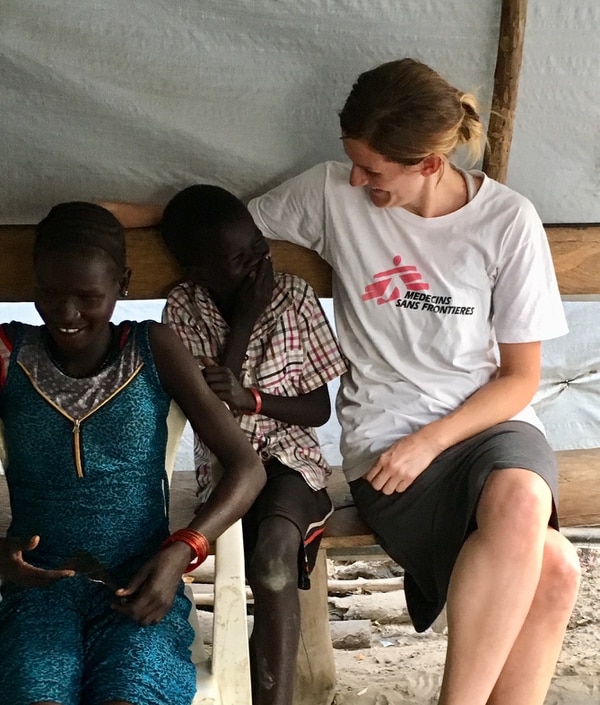By Christopher Smart
The Salt Lake Tribune
South Sudan is a country at war with itself, where atrocities are common and medical care is scarce.
But Utah midwife Kirsti Rinne didn’t hesitate to sign up with Doctors Without Borders to help women in a remote region of the east African country who otherwise would be without health care.
“Their world is much different. They have seen things I can’t imagine,” she said last week about her patients and friends there. “They come away somehow knowing that suffering is just part of life.”
Rinne, 36, a Brigham Young University graduate, also holds a nurse practitioner master’s degree from Boston College and additional credentials from the University of Utah in midwifery. She recently returned to Salt Lake City after three months in the small village of Lankien near the war zone.
“I love Utah,” she said while sipping coffee in her condominium, speaking in relaxed tones of her experience half a world away, where there are no snow-capped mountains, running water or electricity. Life is hard there — and cheap.
“There is a bit of culture shock [when returning to the U.S.],” she said. “This world and that world are so different. Nothing here reminds me of there. [South Sudan] really feels like a dream.”
In reality, it was witnessing pain and death, helping some to survive and gaining a broader understanding of the human condition stripped to its essence.
It was Rinne’s second stint with Doctors Without Borders, the international humanitarian group dedicated to providing medical care to people in distress. In 2015, she spent six months with the agency in Ethiopia.
Presently, she works for University Hospital and Intermountain Healthcare.
In South Sudan, she was the manager of a 24-bed maternity unit at the Doctors Without Borders hospital in Lankien, in the nation’s northeast region. The maternity ward receives about 100 admissions and delivers almost 50 babies each month, according to the organization.
As the only trained midwife on site, Rinne was on call 24/7 and was responsible for overseeing all reproductive and sexual health activities, including the sexual violence program. Sexual violence to young women and girls in South Sudan is not a rare occurrence, she said.
“We also offer birth control,” Rinne added. “But the people there like large families.”
Although Lankien is relatively small, women from around the region seek help at the hospital there.
Rinne lived in a small hut in a compound that included the 120-bed hospital. There was one working water well in the village but no electricity. The hospital, however, generates its own electricity. Of 300 staffers, 10 came from outside the country.
Soldiers in such places usually leave Doctors Without Borders staff alone. Nonetheless, risks are prevalent and hospital personnel are on curfew and rarely leave the compound, Rinne explained. But she liked to take walks around the village.
“I always had to wear my [Doctors Without Borders] shirt and have a radio on me,” she said.
South Sudan is rich in oil. But most of the profits were kept in the Sudanese capital of Khartoum, near the northern ports on the Red Sea, where it is exported, mostly to China. That is chief among reasons why South Sudan broke away from Sudan in July 2011.
By December 2013, the new nation began to unravel along ethnic lines. The ongoing conflict between President Salva Kiir’s government forces of the ethnic Dinka and former Vice President Riek Machar’s ranks of the Nuer people has displaced 4 million people and led to a catastrophic food shortage.
Tens of thousands have died fighting.
Not far from Lankien, tribes clashed during a cattle raid, Rinne recalled.
“Forty-seven were killed, and we received 15 wounded,” she said. “They were women, children and men.”
Even without war, life there is difficult. Women in South Sudan routinely walk miles each day for water and scrounge food the best they can. Some young mothers have lost their husbands to warfare. An estimated 1.5 million are on the verge of starvation.
One poorly nourished pregnant woman walked nine hours to the hospital and then delivered a 2.6-pound baby. The mother remained at the facility for two months before her child reached 4 pounds, Rinne recalled. By that time, the Utah midwife had become quite close with her patient and baby.
Rinne and her outreach team were planning a trip to the woman’s village and decided to fly her home — a 15-minute flight — sparing her the nine-hour trek. It was the woman’s first time in a plane. (Hospital staffers are forbidden to drive on roads there, she said. It is too dangerous.)
The day after they dropped the young mother at her village, it was shelled by artillery.
“My heart sank [when the news came]. I wondered what had happened to the woman and her 4 pound baby,” Rinne said. “She had enriched my experience so much.”
A month later, Rinne’s team returned to the village. Her patient had somehow survived by running into the bush with her child to find cover.
“There she was with her big, fat baby,” Rinne said with a smile. “Proof of human resilience.”
In another instance, she informed a mother that her daughter was going to die. As she did so, Rinne began crying. But the woman, who spoke only Nuer, comforted her and told the medic to tell the midwife not to worry, everything would work out.
“I think of her a lot,” Rinne said. “And when I see people suffering, I say, ‘OK, there is suffering, but there are other things in life, like love and joy.’ ”
From a young age, Rinne explained, she knew she dreamed of working in global health care.
“I wanted to be part of an organization that valued neutrality and people,” she said. “I chose Doctors Without Borders because I know how big of a difference they make.”
And she, too, wanted to make a difference. But at some point Rinne realized the social, political and geographic currents are more challenging than she expected.
“I can bring a little health care and a little tenderness,” she said. “I hope I made a positive impact. I know they made an impact on me. I came back a changed person.”


